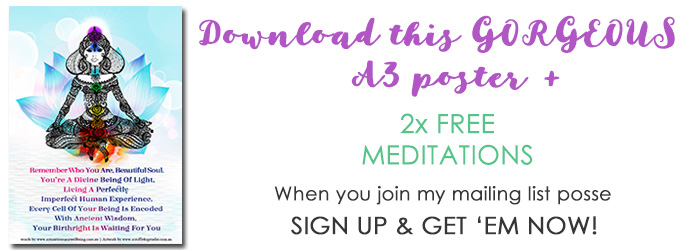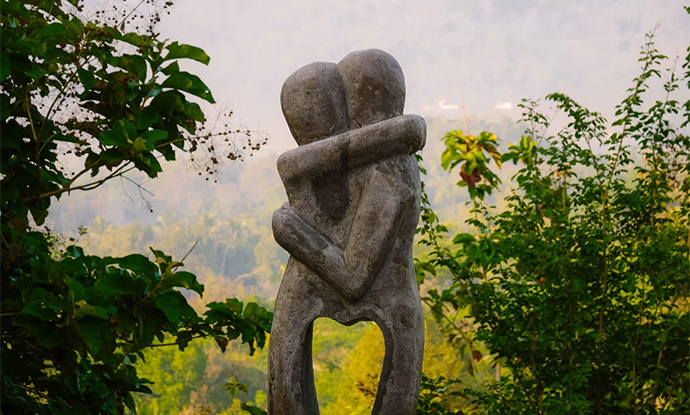Recently I was asked about my understanding of co-dependency, and I thought I’d share the conversation more widely on my blog.
Co-dependency usually shows up in our adult life when we’ve experienced insecure attachment styles in childhood. Insecure attachment has many causes.
It’s often via trauma, or second-hand trauma from parents who didn’t have their own secure attachment experience as children.
Co-dependency can be described as a relational dynamic between two or more people who have developed a shared need for each other, based on what they think the other person offers them.
The belief might be that the other person(s) has something they can’t source within themselves. It can be an equal level of need, or a dynamic where one person has a higher level of need than the other.
There may be a feeling that life wouldn’t be okay without the other person, which is how an unhealthy attachment (a craving or desperation) forms.
The needs being met in this pattern can be the same for each person or not, and can form the basis of a trauma bond.
Emotional dysregulation
Generally speaking, a co-dependent relationship is dysregulated, which might not be noticeable until one person stops fulfilling the needs of the other, consciously or subconsciously.
When we’re a co-dependent dynamic, we can end up feeling manipulative and/or manipulated. As if we can’t live or cope without the other person in our life.
So you might find yourself taking actions to keep them in your life, or they could do this towards you.
For example, if you’re someone with a core wound of feeling rejected or abandoned, the person you’re in a co-dependent dynamic with might overwhelm you with “love-bombing”, or always being available for everything as a way to keep you hooked into your shared pattern.
It’s not obvious until it is…
It can be hard to see co-dependency in our relationships when we haven’t thought about it before, the same way it can be hard to see our own experiences of trauma.
Because they are simply our lived experiences, and we generally consider those patterns just our “normal life”.
But dysregulation is not actually that normal, it’s just normal for our own understanding and experience.
Beginning to unwind the pattern
When there’s a rupture in a co-dependent relationship, this is an excellent time to begin to investigate what’s going on under the surface.
The reason we develop co-dependent patterns is because we’ve learned that having our needs met is something that only someone else can do for us.
We’ve never learned or had it modelled to us that we can in fact, meet and care for our own needs and desires.
It’s often our core needs that we might be seeking external fulfillment for: love, protection, safety, belonging, security and so on.
Co-dependency can be an inter-generational trait
Parents who haven’t done their own healing work might experience co-dependency themselves, and will unconsciously teach this to their children in their relationship with friends, as well as with their kids.
For example, a parent might make a child responsible for things that they shouldn’t, and the child is praised for capitulating.
As such, the child learns that if they take on what other people ask of them (no matter how inappropriate it might be), this is a way to experience feeling loved.
There’s a million different ways this can play out.
Co-dependency and narcissism
Co-dependency tends to go hand in hand with people who display narcissistic behaviour patterns.
Someone displaying narcissistic behaviour tends to seek out those with high degrees of empathy and dependence on others (co-dependence). They seek narcissistic supply from those it’s easiest to receive from.
The truth is, narcissistic behaviour is simply co-dependency with a power imbalance!
Seeking externally vs within
We find ourselves in these dynamics with others when we are seeking something from another person that we feel we don’t have within ourselves.
And I find the more that we do our own inner work, the more subtle and trickier to see the layers become.
Even if we’ve done a lot of work in this area there can always be other experiences where we haven’t yet uncovered what’s going on.
Do I have to end my relationship if it’s co-dependent?!
You’re the only person who can answer this question. And it really depends.
If you feel that someone you’re in a co-dependent dynamic with is open to consciously exploring what’s going on, and if you’re both willing to do the work to shift to a healthier way of relating, then YAY.
But that’s not always how it goes. Sometimes only one person is willing to do the work. Again, that might be enough. Especially if you begin to communicate your boundaries and shift your own actions and that is respected by the other person.
Sometimes, it might not work out that a relationship can be saved. But there’s definitely lots of scope for investigating the possibilities.
Now I know about it, what can I do?
There’s a few different remedies we can explore to resolve any co-dependent patterns we might have.
The first one of course is just boundaries, boundaries, boundaries!
Boundaries in all the different ways and experiences where we find our boundaries porous (people pleasing, saying yes when we mean no, tolerating poor behaviour from others etc).
Boundaries in all the ways you can imagine and then the ways you can’t imagine, because there’s so many ways boundary issues can show up.
The other really important remedy is doing the inner work – gaining an understanding of what it is that you’re seeking from someone else.
This can include uncovering your childhood experiences, beliefs and sabotage patterns. Kinesiology is brilliant for this work!
How did we get here?
The reason we form co-dependent bonds is because that’s how it may have been modelled to us. In order to get love, you rely on needing and wanting people, and making yourself useful to them.
Instead of learning to love and nurture your Self. Or affirming your usefulness and value to your Self, without needing other people to generate those feelings for you.
Co-dependency can show up as the desire to feel needed or wanted, or trying to save other people, getting over-involved in other people’s lives or letting people do those things for you.
Our patterns can be subtle or obvious, or both.
The important keys…
Are inner work, boundaries, and inner nurturing… in any area or timeline of your life where there’s some need or craving for self-love, self-approval, self-nurturing that hasn’t been met, and where you’re trying to meet those needs externally in co-dependent bonds with another person.
Ultimately as an adult it comes down to regaining your boundaries and power, and learning to care for your own needs.
The remedies are very similar for those who’ve been involved with people who display narcissistic traits.
Becoming your own source of approval and love
The most important work you can do is to embody a deep understanding that you can be the source of meeting your own needs.
Which doesn’t mean we can’t want or need other people in our lives. But if we give them power over our wellbeing based on their involvement in our lives, this gets into co-dependent territory.
Getting support
You might want to work with a mental health care professional to unwind co-dependency dynamics in your life as well as Kinesiology.
With topics like co-dependency, it’s definitely good to have a team supporting you as you work through the layers.
But when you do, you’ll be amazed by the power and strength you discover within yourself.
Learning and implementing healthy boundaries is always a very good starting point!
Resources
There are beautiful people out there who specialise in assisting people to move beyond dysfunctional dymanics with co-dependency and narcissistic abuse. Here are three of them:
- Claire Nettley – a lovely boundaries and co-dependency coach
- Nathalie Martinek – offers an abundant range of resources for “hacking narcissism”, both for personal and workplace relationships
- Melanie Tonia Evans – offers a Narcissistic Abuse Recovery Program
Much love,

 |
Ambha Amanda Roberts is a Kinesiologist, Intuitive Healer, educator and facilitator based on the Sunshine Coast, Australia. She offers Kinesiology sessions both in-person and via Skype/Zoom all over the world. Ambha Amanda is the co-creator of Adventures of Staria, which includes a series of Staria cards, and an upcoming book for children (including inner children). |


